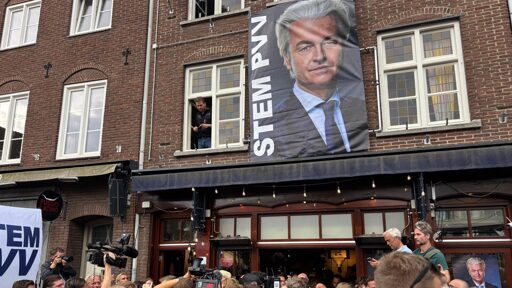The far-right Party for Freedom (PVV) suffered a major blow in the snap general election it triggered earlier this year after leaving the governing coalition, losing a projected 11 seats in parliament.
Instead of securing the victory he had hoped for, PVV leader Geert Wilders found himself locked in a neck-and-neck race with the liberal Democrats 66 (D66), which grew from nine to 26 seats. They are followed by the conservative People’s Party for Freedom and Democracy (VVD) with 22 seats, the GreenLeft-Labour alliance (GroenLinks-PvdA) with 20, and the Christian Democratic Appeal (CDA) with 18 projected seats.
Read more: Dutch far-right leader Geert Wilders collapses government coalition
On Thursday morning, the margin between the PVV and D66 stood at fewer than 2,000 votes, expanding to over 15,000 in favor of the liberals through the day. D66 had campaigned on tackling the housing crisis, promoting a green economy, and building “a country for everyone.” In contrast, Wilders and the far right continued with their standard narrative, including a hardline anti-migrant and racist rhetoric that stands out even in Europe’s increasingly xenophobic political establishment.
Following the regular 2023 general election, the PVV entered a coalition government with other conservative forces but collapsed it after partners refused to endorse some of their most extreme proposals. In the leadup to Wednesday’s vote, virtually all major parties explicitly ruled out joining a new coalition with Wilders even if his party emerged as the relative winner.
Despite these announcements, Wilders insisted throughout Thursday that the far right party should be given the first chance to attempt to form a government if it secured even a narrow lead. “The PVV wants to take the lead in forming a coalition if we become the largest party,” he wrote on social media. “Until there is 100% clarity on this, no D66 majority seeker can get to work. We will do everything we can to prevent this from happening.”
For his part, D66 leader Rob Jetten signaled his party would explore most coalition options except the PVV in its attempt to reach the majority required to govern. However, government coalition negotiations in the Netherlands are often lengthy, and whatever the structure of the next administration might be, it is likely to take weeks or months to confirm.
Read more: The left wins the presidential election in Ireland by a landslide
Beyond the final duel between D66 and PVV, the election turned out to be a setback for the social democratic GreenLeft-Labour alliance, which had been seen as Wilders’ main challenger earlier in the campaign. The alliance lost five seats compared to its 2023 results, prompting Frans Timmermans to announce his resignation as party leader.
The final confirmation of the vote count is expected in a couple of days, as ballots from some territories and votes from abroad are still being processed.
The post Far right ties with liberals in Dutch general election appeared first on Peoples Dispatch.
From Peoples Dispatch via this RSS feed


